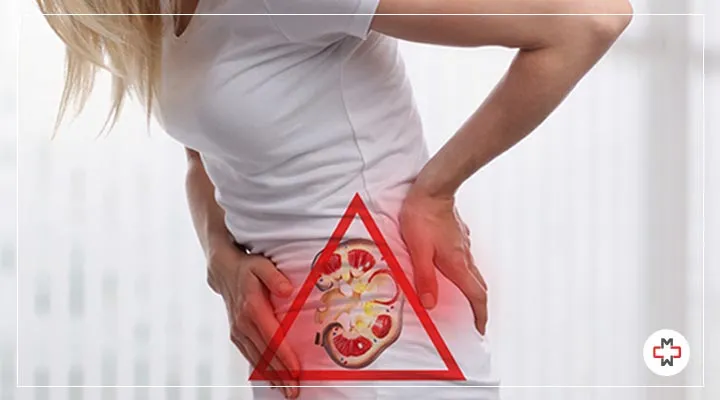Understanding the Distinctions In Between Kidney Stones vs UTI: Key Signs and Treatments
Wiki Article
Checking Out the Effects and Causes of Kidney Stones in Comparison to Urinary System Infections: An In-depth Overview
The exploration of kidney rocks and urinary system infections (UTIs) exposes a complex interplay of symptoms and underlying reasons that necessitate mindful exam. What are the vital distinctions in their signs and symptoms, and just how might these inform treatment methods?Introduction of Kidney Stones
Kidney rocks, likewise recognized as kidney calculi, type when particular substances in the urine crystallize and aggregate, leading to the advancement of hard deposits within the kidneys. These stones can vary in dimension, varying from a grain of sand to a golf ball, and can be composed of different materials, one of the most typical being calcium oxalate, uric acid, struvite, and cystine. The formation of kidney stones is affected by several variables, including nutritional behaviors, fluid intake, and hereditary proneness.Symptoms of kidney stones might consist of serious discomfort in the back or side, blood in the urine, nausea or vomiting, and regular peeing, particularly as the rock moves with the urinary system. Diagnosis normally involves imaging research studies such as ultrasound or CT scans, alongside urinalysis to recognize the stone's make-up.
Therapy alternatives vary based upon the dimension and type of rock, as well as the extent of signs (Kidney Stones vs UTI). Tiny rocks might pass normally with increased fluid consumption, while bigger rocks might require clinical interventions such as lithotripsy or medical removal. Understanding the pathophysiology and threat aspects related to kidney rocks is necessary for effective avoidance and administration
Overview of Urinary System Infections
Urinary system infections (UTIs) are typical microbial infections that impact any kind of part of the urinary system, consisting of the kidneys, ureters, bladder, and urethra. They primarily take place when germs, usually from the intestinal system, go into the urinary system, bring about inflammation and infection. UTIs are categorized into 2 main types: straightforward and complex. Uncomplicated UTIs typically happen in healthy and balanced individuals with typical urinary system tracts, while complex UTIs might arise in individuals with hidden problems, such as structural irregularities or endangered body immune systems.The frequency of UTIs is notably greater in ladies than men, mostly due to physiological distinctions, such as a much shorter urethra. Threat variables consist of sex, certain contraceptive techniques, urinary system retention, and dehydration. The medical diagnosis of UTIs is normally verified with pee examinations, which might disclose the visibility of microorganisms, leukocyte, or red cell.

Symptoms of Kidney Stones
The pain related to kidney rocks can show up in numerous methods, typically leading individuals to seek clinical focus. One of the most usual signs and symptoms is serious pain, typically why not try these out local in the reduced back or side, which may emit to the abdominal area or groin. This pain, often referred to as sharp or cramping, can happen all of a sudden and may rise and fall in strength.In addition, individuals might experience hematuria, or blood in the pee, which can range from tiny amounts to noticeable discoloration. This symptom might be gone along with by changes in urinary system practices, such as raised regularity or urgency, along with discomfort throughout urination. Nausea or vomiting and vomiting are additionally common, often arising from the body's reaction to extreme pain.
Sometimes, individuals might experience high temperature and chills, especially if a secondary infection develops as a result of the blockage triggered by the rocks. On the whole, the combination of serious discomfort, hematuria, altered urinary patterns, and intestinal signs and symptoms can offer considerable understanding right into the presence of kidney stones, calling for punctual medical assessment and treatment. Recognizing these symptoms is essential for timely medical diagnosis and reliable monitoring of the condition.
Symptoms of Urinary Tract Infections
Infections within the urinary tract commonly offer a range of distinctive symptoms that can considerably affect every day life. The most usual signs include a relentless impulse to pee, commonly accompanied by a burning experience during urination, understood as dysuria. Individuals might likewise experience raised regularity of peeing, creating percentages of urine each time.Other noteworthy symptoms you can check here include fetid or gloomy pee, which might indicate the visibility of bacteria or pus. In some instances, urine might appear pink or red because of the visibility of blood, a condition recognized as hematuria. Additionally, individuals might experience pelvic discomfort or stress, which can better worsen the feeling of seriousness.
Systemic symptoms may also materialize, such as high temperature, chills, and fatigue, specifically if the infection has risen to the kidneys. It is vital to recognize these symptoms early, as unattended urinary tract infections can lead to extra serious issues. Kidney Stones vs UTI. Prompt medical focus is recommended when these symptoms are observed, permitting suitable analysis evaluation and therapy to relieve pain and avoid additional health problems
Reasons For Each Condition
Often, kidney rocks and urinary tract infections occur from unique yet occasionally overlapping causes that can affect people differently. Kidney rocks usually develop because of metabolic variables, dietary options, and hereditary proneness. Raised degrees of calcium, oxalate, or uric acid in the pee can cause rock formation. Dehydration, not enough fluid consumption, and high-sodium diets can worsen navigate to this site these conditions, promoting condensation within the urinary tract.
Comprehending these distinct reasons is essential for avoidance and treatment. Kidney Stones vs UTI. While lifestyle alterations might mitigate the threat of kidney rocks, appropriate health and punctual therapy of urinary system infections are vital for reducing their reappearance and connected issues
Verdict
In summary, kidney rocks and urinary tract infections existing distinctive signs and symptoms and underlying reasons. Kidney stones are characterized by serious discomfort and metabolic elements, while urinary tract infections mainly involve bacterial infections leading to urinary seriousness and discomfort.The exploration of kidney stones and urinary system system infections (UTIs) discloses a complicated interplay of symptoms and underlying causes that call for careful assessment.Urinary system tract infections (UTIs) are typical microbial infections that impact any kind of part of the urinary system, consisting of the kidneys, ureters, bladder, and urethra.Frequently, kidney stones and urinary system infections arise from unique yet in some cases overlapping reasons that can affect individuals in different ways.In summary, kidney stones and urinary tract infections existing distinct symptoms and underlying reasons. Kidney rocks are identified by serious discomfort and metabolic elements, while urinary system tract infections mainly entail bacterial infections leading to urinary system necessity and pain.
Report this wiki page